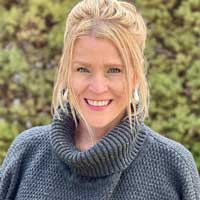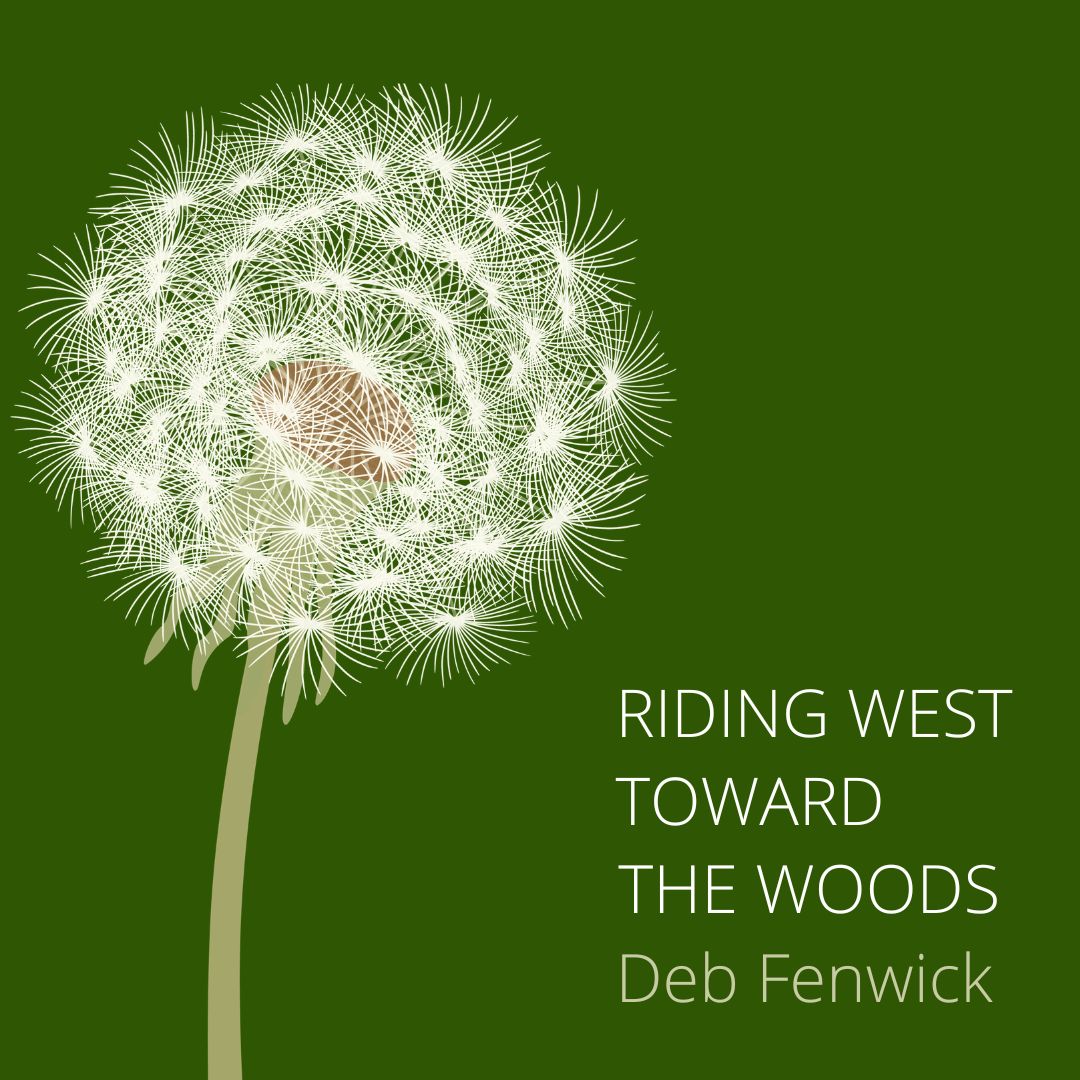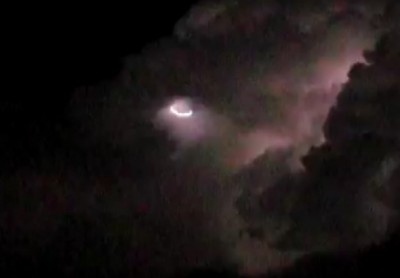Deb Fenwick
RIDING WEST TOWARD THE WOODS
The dandelions in the front yard have the audacity to pop up screeching yellow, blanketing the lawn. I’m crouching, trowel in hand, yanking and destroying. The soil won’t easily yield. But neither will I. I’m determined to unearth every last one. Each spring, I try to get the upper hand—dig them up before the yellow flower stage—eradicate them before they turn to seed and drift through the breeze, propagate, and start the whole cycle over.
I plunge the narrow blade of the trowel around the perimeter of a large clump of toothy leaves, working it around the edges, rocking it up and down to unearth the taproot. Dandelion roots go deep.
In the halcyon haze of childhood, dandelions were daisies. Wildflowers. Wishes. By the time I had a mortgage, they’d lost their magic. I don’t try to keep up with neighbors who spend Saturdays spreading fertilizer, mowing, and edging. Although their grass does look greener. It’s more about control. Order. When I’m in the garden, I lie to myself. I imagine I have control over what will live and die.
I don’t use pesticides in the garden. Nor do I poison plants I deem undesirable, preferring instead brute force. I twist, uproot, and decapitate dandelions.
Just when it feels like a plant will give, I pull hard from the base, anticipating the satisfaction of yanking the entire thing out of the soil. Sometimes, the milky white root servers, and the longest part of the plant remains in the ground.
It’s been this way all morning. Some wins getting the roots out. Some losses. But I’ve got a pile of withering greens to show for my work. My back aches, and there’s a throb in my right knee.
Standing slowly, holding the trowel, I roll the tension out of my neck as a pack of middle-schoolers on bikes roars down the street. Mostly boys, but a few girls. They blow right through the stop sign. The leader shouts over his shoulder, and they laugh and swerve, barely missing a parked car. A smaller kid in the back pedals faster than the others to keep up. She works hard to stay with the group riding west toward the woods.
◊
I rode with my older cousins and their friends in the street. Yes, the street. I was ten years old riding my fast-as-a-rocket red bike straight into midwestern springtime. Weaving on wide lanes of black tar asphalt with city drivers and Chicago potholes meant I’d graduated to ride with twelve- and thirteen-year-olds. That day, I kissed the city sidewalk goodbye and launched straight into the cool kid stratosphere.
We were a loud, raucous tribe riding right down the middle of Barry Street. Like we owned it. We laughed and headed away from home with no particular destination—just springtime-freefall riding toward some vague promise of adventure.
My stomach was alive with excitement as we swerved in unison like a flock of geese migrating through Illinois skies after the long winter. I had just shed my own layers: scratchy wool sweaters, hats, gloves, and every piece of clothing that protects a body from frost and freeze. I was liberated. Spring was short sleeves and a breeze across the skin. It was so much easier to move in a springtime body.
A swirling dust of iridescence floated through the air—a mist of silver seeds set free from earth-bound lives. Thousands. Hundreds of thousands. More than we could count. Each had transmuted to lift off on a breeze, activated, exhilarated in flight. Seeds landed in hair and drifted into mouths as we laughed hard and loud.
Dappled sunshine tracked us through newly birthed maple leaves. Glints of pollen and apple blossom shimmered. For a moment, I wondered if I could make time stop if I just stopped my bike. I wanted to stay there in the glitter-green space between home and the unknown.
But I didn’t stop. The group kept pedaling, and so did I. With my oldest cousin in the lead, racing west toward the city boundary, cars and traffic were no match for us. We rode out past River Road and straight into the muddy woods. We crossed the graffitied iron bridge over the Union Pacific tracks. Bike tires kicked up gravel, and we kept going. We hooted and shouted, wild in the tunnel east of Thatcher Road. We howled to hear the power of our voices echoing and bouncing off concrete. Steering, pedaling, and weaving, we roared from deep in our bellies that day. Because no one told us not to.
Eventually, the wind carried our bikes and every soft parachute of seed back home. We let our bicycles drop to the sidewalk, reluctantly returning to earth-bound lives. I arrived back at my frame house, where there were chores, routines, and parents who had forgotten that bikes are actually rockets.
That night, in my twin bed with the lights out and the window open just an inch, my feet buzzed electric, like they were still pedaling. Even with my eyes closed, I saw speckled sunlight on black asphalt. Dandelion breeze quivered in my throat. My body was speed—awake and alive with rebellious tunnel shouts. I didn’t want to sleep. I wanted to howl in the springtime air all night.
And, poof, like a childhood wish, the memory fades off into the wind.
◊
Squinting into the sun, the tension in my shoulders feels heavy. I look down to find my knee swollen from bending. At my feet, a limp heap of dying dandelions waits to be taken to the compost bin, where they’ll decompose into carbon and nitrogen—where they’ll release into an afterlife as soil, water, and air.
With a final bend, or maybe it’s more of a bow, I reach down and gather slack roots and leaves, shaking off the soil. Carrying the trowel in one hand and dandelions in the other, I walk back toward the compost bin—past daffodils and tulips, past rows of seedling tomato plants awaiting the metal cages I’ll put around them when they get unruly in mid-July.
I toss a day’s work into the bin with all the other weedy cast-offs and call a truce with the dandelions. I’ll let the grass go a little wild this year—watch yellow blooms become downy spheres. And when star-shaped seeds disperse into the breeze, I’ll watch them fly electric, spark-like, through early spring air on a rocket.
 Deb Fenwick is a Chicago-born writer who currently lives in Oak Park, Illinois. After spending nearly thirty years working as an arts educator, school program specialist, and public school administrator, she now writes stories that have been patiently waiting to be told. Her work has appeared in Hippocampus Magazine. You can connect with her on Twitter @debfenwrites.
Deb Fenwick is a Chicago-born writer who currently lives in Oak Park, Illinois. After spending nearly thirty years working as an arts educator, school program specialist, and public school administrator, she now writes stories that have been patiently waiting to be told. Her work has appeared in Hippocampus Magazine. You can connect with her on Twitter @debfenwrites.
Read more from Cleaver Magazine’s Issue #38.
Submit to Cleaver!




